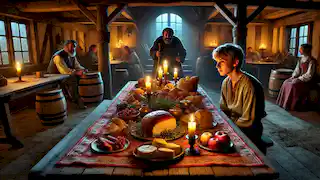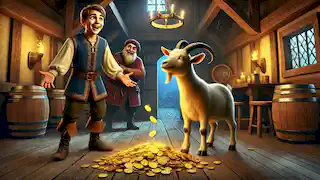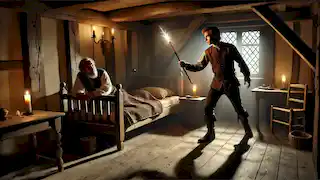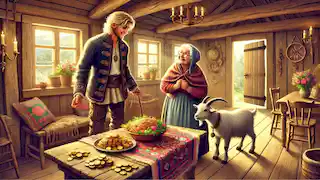In a quaint little village nestled amidst towering mountains and shimmering fjords, there lived a young lad named Hans. Hans was known for his bright spirit, a love for adventure, and a curiosity that often got him into trouble. He lived alone with his old mother in a small, cozy cottage, surviving on what little they had. The roof was patched with straw, and the walls were crooked, but it was a home full of warmth and love.
One chilly morning, Hans was sent by his mother to fetch some flour for baking bread. He packed an old sack and started his journey toward the village market, humming a tune as he made his way. The wind blew fiercely that day, making it seem colder than usual, but Hans didn’t mind. He always found beauty in the wind’s whisper.
He finally bought the flour and began his journey back. As he neared his home, an even stronger gust of wind tore through the valley, and suddenly, all the flour flew right out of his sack! Hans watched in disbelief as the North Wind carried away everything he had bought, scattering it across the land.
“Well, this isn’t fair!” Hans said, clenching his fists. “The North Wind owes me for the flour it took, and I’m going to get it back!” Without a second thought, Hans decided to set out to find the North Wind, determined to demand his share back.
He walked on for many days, crossing hills and valleys, rivers and forests, until he finally reached the North Wind's mighty castle. It stood on top of a snow-covered mountain, with towers made of ice that sparkled in the light.
“Hello there!” Hans called out. “North Wind, I’ve come to get back the flour you took from me!”
The North Wind heard Hans’s voice and came rushing down from his castle, a swirl of snow and ice swirling around him. “What do you want, little one?” the North Wind boomed, his voice echoing across the mountains.
“You took my flour, and it was all we had,” Hans said bravely. “I want it back, or something to make up for it.”
The North Wind let out a hearty laugh. “You are a bold one, coming all the way here to demand what you lost,” he said. “Very well. I will give you a magical tablecloth. Whenever you say, ‘Spread out, little cloth!’ it will give you whatever food you wish.”
Hans couldn’t believe his luck. He thanked the North Wind profusely and began his journey back home, excited to show his mother the wonderful gift.

That evening, as the sun dipped behind the mountains, Hans stopped at an inn to rest. He was hungry, so he decided to test the tablecloth. “Spread out, little cloth!” he said. To his amazement, the tablecloth instantly spread out before him, laden with all kinds of delicious food—roasted meats, fresh bread, cheese, fruits, and more. The innkeeper, watching from the shadows, saw this and thought, “Such a marvelous cloth! It should be mine.”
Later that night, when Hans was fast asleep, the innkeeper crept into his room and replaced the magic cloth with a plain one, identical in appearance.
The next morning, Hans set off for home, blissfully unaware of the theft. When he arrived and showed the tablecloth to his mother, it did not work. No matter how many times he tried saying, “Spread out, little cloth!” nothing happened. Hans was heartbroken.
“I will go back to the North Wind!” Hans declared, his resolve stronger than ever. “I will tell him this gift didn’t work!”
Once more, Hans made the long journey back to the North Wind’s castle. When he arrived, he explained how the tablecloth didn’t work. The North Wind frowned but didn’t argue.
“Hmm,” said the North Wind, “perhaps my gift was not suited to you. Here, take this goat instead. It is special, for whenever you say, ‘Make money, goat!’ it will produce gold coins.”
Hans’s eyes lit up with joy, and he thanked the North Wind once more. He began his journey home, excited to share this wondrous gift with his mother.

That evening, he stayed at the same inn. And once again, the innkeeper, who had heard of the lad’s new treasure, decided to steal it. While Hans slept, the innkeeper switched the magic goat with an ordinary one.
When Hans reached home, he eagerly showed his mother. “Make money, goat!” he commanded, but nothing happened. Again, his heart sank.
“This time, I won’t give up,” Hans said, his jaw clenched in determination. “I’ll go back and demand what I am owed.”
For the third time, Hans trudged through the mountains to the North Wind’s castle. The North Wind listened to the lad’s story with a puzzled expression and finally said, “Ah, I see now what has happened. Very well, this time, take this stick. It’s an ordinary-looking stick, but if you say, ‘Stick, lay on!’ it will give a good beating to anyone who tries to deceive you.”
Hans wasn’t sure how a stick would help, but he accepted it gratefully. As he traveled home, he stopped by the same inn yet again, tired and in need of rest. This time, when the innkeeper sneaked into Hans’s room, the lad was prepared.
“Stick, lay on!” Hans cried, and the stick sprang to life, flying into the air and giving the innkeeper a thorough thrashing. The innkeeper begged and pleaded for mercy, finally confessing to stealing both the tablecloth and the goat. He returned them to Hans, who took them back, thanking the stick before it finally calmed down.

The next day, Hans returned home with all three gifts—the tablecloth, the goat, and the stick. His mother was overwhelmed with joy, and from that day forward, they never had to worry about food or money again.
Hans became known far and wide as the clever lad who outwitted even the mighty North Wind. And he always kept the stick close by, just in case anyone else tried to take advantage of his good fortune.
Years passed, and Hans grew into a man, but he never forgot the lesson he learned. He always remembered that courage, persistence, and a bit of cleverness were worth more than any riches in the world.

And so, the lad who went to the North Wind lived happily ever after, his heart as rich as the gold his goat could produce and his life as bountiful as the tablecloth that fed him. And as for the stick? It hung by the door of his cozy cottage, a reminder to everyone that no one should ever try to cheat a lad as clever as Hans.The End



















